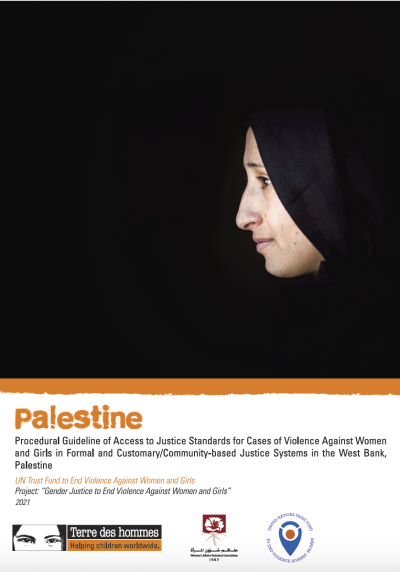Access to Justice Standards for Cases of Violence Against Women and Girls in Formal Customary/Community-based Justice Systems in the West Bank, Palestine
- Log in to post comments
In Palestine, women and girls experience multiple layers of violence and discrimination and face conditions of oppression on two fronts: they live under the Israeli occupation (which, among others, has led to female bodies being weaponized and re-shaped into a tool of political control) and live within a society governed by patriarchal norms and attitudes. This implies the establishment of a generalized concept of gender inferiority that develops from the early stages of life and solidifies through the social constructs and stereotypes that perpetuate the cycle of violence, their participation in the spheres of public life, and decision-making in private life. Ultimately, this severely limits the exercise of women’s and girls’ rights. VAWG is a socio-culturally rooted problem exacerbated by the footprint of the prolonged conflict, the impact on community/family structures, and the difficulty of access to services, and deeply particular when tackling justice for women and girls’ survivors/victims of violence.
The Procedural Guideline of Access to Justice Standards for Cases of Violence Against Women and Girls in Formal and Customary/Community-based Justice Systems in the West Bank (Palestine) has been developed to provide key guiding principles and operational recommendations (non-exhaustive) across the different legal and justice stages that female (adults and children) survivors/victims of VAWG experience. It has been carried out to reinforce the capacities and to enhance the quality of the processes of the supply-side of justice dealing with VAWG cases; however, it can serve to raise awareness, provide information, and empower survivors/victims and/or their persons of support. The Procedural Guideline is expected to serve as a tool to evaluate and monitor the justice pathways when addressing and making intervention plans for women and girls survivors/victims of violence ensuring that, whether the intervention is made by formal or community/ customary justice actors, appropriate standards apply and abide by, enabling a justice environment in which survivors/victims are treated fairly, with respect, dignity, and equality.

